Papers by Rick Stapenhurst
Parliamentary Affairs, 2012
Parliaments are the institutions through which governments are held accountable to the electorate... more Parliaments are the institutions through which governments are held accountable to the electorate. They have a wide range of tools with which to carry out this oversight function, but until recently little analysis had been undertaken on the characteristics or use of such tools. This paper uses data for 83 countries that was collected in 2001 to investigate whether the oversight potential relates to three variables, namely the form of government (presidential, semi-presidential, or parliamentary), per capita income levels, and the level of democracy.
Building strong institutions is a central challenge of development and is a key to controlling co... more Building strong institutions is a central challenge of development and is a key to controlling corruption. Among public institutions, the Supreme Audit Institutions (SAIs) play a critical role, as they help promote sound financial management and thus accountable and transparent government. However, the full potential of the SAI to address corruption has not been exploited, in part because of the lack of understanding of the overall capacity of the SAI.
SSRN Electronic Journal, 2000
During the 1990s, more than a quarter of the countries of the world revised their constitutions t... more During the 1990s, more than a quarter of the countries of the world revised their constitutions to include an expand the role of their legislatures. This paper examines one of the most important roles for legislatures-that of financial oversight-and considers some of the lessons emerging from a decade of legislative development and reform.
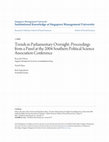
The purpose of this paper is to discuss why and how ethics reforms have been enacted by many parl... more The purpose of this paper is to discuss why and how ethics reforms have been enacted by many parliaments in the course of the past decade. Our argument is fairly straightforward. Politicians' perceived irresponsiveness, various forms of misconduct and corruption scandals have eroded voters' trust in politicians and political institutions. In order to induce a more ethical behavior among politicians as well as to rebuild public trust in political institutions, ethics regimes have been adopted by several legislatures. Such regimes have generally taken two main forms: ethics codes and conduct codes. Ethics codes tend to be fairly general documents: they formulate broad principles of behavior but they do not define what is appropriate and what is inappropriate behavior, nor do they establish sanctions for violations of the code. By contrast, codes of conduct tend to contain very specific provisions with clear sanctions for those who violate the dispositions of the code. Terminological confusion arises, however, because some parliamentary ethics codes include dispositions and sanctions that are more commonly found in codes of conduct. This paper attempts to clear this terminological confusion, reviewing the dispositions and sanctions that may included in both ethics and conduct codes, with special attention to probable success factors. It underlines the importance of cultural factors, suggesting that one of the success factors is whether the individuals that the code is regulates actually share the same ethical standards, have a common understanding of what is appropriate behavior and a common understanding of what constitutes misconduct.
... Home > Griffith Research Online > Statistics for item "Legislatures and Oversight:... more ... Home > Griffith Research Online > Statistics for item "Legislatures and Oversight: A Note". Statistics for item "Legislatures and Oversight: A Note". ... Title Legislatures and Oversight: A Note Author(s) Pelizzo, Riccardo; Stapenhurst, Rick Date Last Updated Tuesday, July 20, 2010 ...
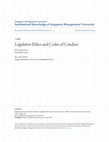
The purpose of this paper is to discuss why and how ethics reforms have been enacted by many parl... more The purpose of this paper is to discuss why and how ethics reforms have been enacted by many parliaments in the course of the past decade. Our argument is fairly straightforward. Politicians' perceived irresponsiveness, various forms of misconduct and corruption scandals have eroded voters' trust in politicians and political institutions. In order to induce a more ethical behavior among politicians as well as to rebuild public trust in political institutions, ethics regimes have been adopted by several legislatures. Such regimes have generally taken two main forms: ethics codes and conduct codes. Ethics codes tend to be fairly general documents: they formulate broad principles of behavior but they do not define what is appropriate and what is inappropriate behavior, nor do they establish sanctions for violations of the code. By contrast, codes of conduct tend to contain very specific provisions with clear sanctions for those who violate the dispositions of the code. Terminological confusion arises, however, because some parliamentary ethics codes include dispositions and sanctions that are more commonly found in codes of conduct. This paper attempts to clear this terminological confusion, reviewing the dispositions and sanctions that may included in both ethics and conduct codes, with special attention to probable success factors. It underlines the importance of cultural factors, suggesting that one of the success factors is whether the individuals that the code is regulates actually share the same ethical standards, have a common understanding of what is appropriate behavior and a common understanding of what constitutes misconduct.
O c t o b e r 2 0 0 2 n n u u m m b b e e r r 7 7 4 4
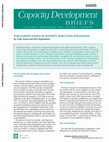
Parliaments play a crucial role in improving governance and public service delivery. Those countr... more Parliaments play a crucial role in improving governance and public service delivery. Those countries with strong parliamentary oversight have been able to shape policy directions and priorities. This article explores the growing role of parliaments in crafting poverty reduction strategy papers (PRSPs) since the process was first launched in 1999. Although the parliaments of many developing countries still have a long way to go before they will maximize their ability to strengthen the outcomes from country-level poverty reduction strategies (PRSs), the first decade of the poverty reduction strategy process has produced some important examples of the ways that parliaments can get involved, shape the debate, and learn from the experiences of legislatures in other countries. The cases of Tanzania and Malawi illustrate how parliamentary committees and parliaments can develop in terms of policy leverage and leadership.
Http Dx Doi Org 10 1080 03050718 1997 9986471, Aug 12, 2010
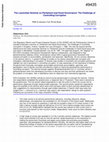
This was the second seminar offered since the initial Laurentian Seminar on Parliament and the Ch... more This was the second seminar offered since the initial Laurentian Seminar on Parliament and the Challenges of Good Governance that took place in Montebello, Canada between July 20-30, 1997. The eight-day program, the "flagship" of EDI-CIDA (Canadian International Development Agency) collaboration, was designed to help parliamentarians address critical, contemporary issues within a good governance framework that stresses principles of accountability, participation and openness. Specifically, the four primary objectives of the seminar were to: 1) present findings of studies on the factors associated with corruption and strengthen understanding of corruption; 2) discuss case studies of successful anti-corruption policies and highlight the role of parliament in controlling corruption; 3) raise awareness on the importance of holding the government financially and legally accountable and promote accountability, openness, and participation; and 4) identify concrete and effective means of improving parliamentary performance in controlling corruption. The seminar brought together 28 parliamentarians from 21 countries (all but 2 parliamentarians were from developing countries) to discuss how they and their parliaments can tackle the problem of corruption. Also in attendance were six observers from international agencies.
... Home > Griffith Research Online > Statistics for item &... more ... Home > Griffith Research Online > Statistics for item "Strengthening Public Accounts Committees by Targeting Regional and Country-Specific ... Committees by Targeting Regional and Country-Specific Weaknesses Author(s) Pelizzo, Riccardo; Stapenhurst, F. Rick Date Last ...








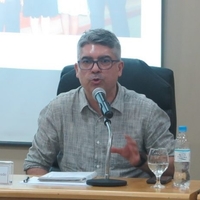

Uploads
Papers by Rick Stapenhurst